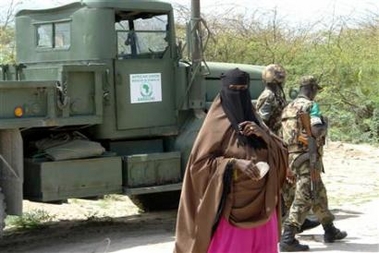Africa
Somali wants UN to send troops
(AP)
Updated: 2007-06-29 10:05
 |
Large Medium Small |
UNITED NATIONS - Declaring that Somalia is at "a critical crossroads," Prime Minister Ali Mohamed Gedi on Thursday urged UN peacekeepers to take over from a small African Union force in the country's capital to help restore security and deal with terrorism.
 A veiled Somali woman walks past Africa Union peacekeepers from Uganda on patrol near Mogadishu's Adan Abdulle international airport June 28, 2007. [Reuters]  |
Gedi blamed the international community for failing to supply funds and logistics so that the bulk of an 8,000-strong African Union force authorized in January could deploy to Somalia.
Only 1,500 AU troops from Uganda have made it to Somalia. That has meant Ethiopian troops, who backed government forces and drove an Islamic movement out of the capital, Mogadishu, in December, have been unable to leave.
In a closed-door speech to the council obtained by The Associated Press, Gedi said the government wants the council to review the deployment so the African Union force "could be transformed into a UN mission."
Gedi said a UN peacebuilding mission in Somalia "would prove its cost effectiveness in terms of outcomes," and he warned that "failure to act at this critical period will be very costly in the future."
But diplomats said there is almost no support for deploying a UN force in Somalia now.
Britain's UN Ambassador Emyr Jones Parry, whose country takes the lead on Somalia in the council, said the African Union force has to be reinforced first - and if there is "sufficient stability" and a political agreement resulting from national reconciliation talks starting July 15, then a UN peacekeeping force is possible.
"It's got to be done by the Somalis themselves to create the conditions for that force," he said. "You can't put peacekeeping troops in if there's no peace whatever to keep. That's the reality."
Gedi said afterwards he told council members that Somalia needs peace, and "if we could do it alone, I wouldn't be here."
"We are seeking the international community and the United Nations to support us in stabilizing Somalia," he said. "So it's not fair to say 'make peace and I will come and keep it.' ... It's not right to ignore or neglect the interests of the Somali people."
Burundi, Ghana, Malawi, Benin and Nigeria have offered troops to the AU force, he said, and Ethiopian troops could also be part of an AU or UN force.
The government was formed in 2004 with the help of the United Nations, but has struggled to assert any real control.
Insurgents have been battling government and Ethiopian forces since they drove the Council of Islamic Courts from Mogadishu and much of southern Somalia six months ago. More than 1,000 civilians have been killed and hundreds of thousands have been displaced.
In his speech to the council, Gedi insisted "security in the capital and in the country as a whole has improved greatly in the last few weeks and will continue to improve."
Gedi told reporters that when the Islamic Courts were routed it became evident that terrorists were operating in Somalia. "Weapons, explosives, ammunition, were imported to Somalia together with external fighters, or militants, or Islamists, or Jihadists in order to destabilize Somalia and the region at large," he said.
Gedi called for regional and international action to deal with terrorism in Somalia "before it is too late." "The situation in Somalia is at a critical crossroads in terms of security, in terms of reconciliation, humanitarian aid delivery and governance," he said.
| 分享按钮 |